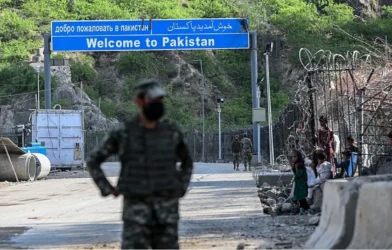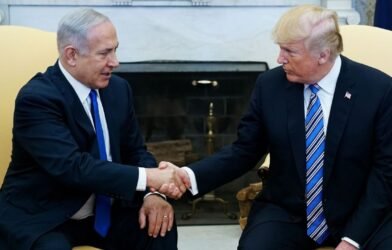Subtotal $0.00

For years, China has made no secret of its dissatisfaction with the existing world order, which it describes as a system built on Western hegemony and treating other countries with double standards and a superior view, and emphasizes that this system has failed to resolve international crises, stressing the need for a new, more just and effective system.
China argues that the current world order is "unfair and excludes the interests of developing countries," citing economic disparities, political interference, and the imposition of Western standards on the majority of the world's countries.
In recent years, China has been increasingly vocal in calling for the reshaping of the international system in line with its values and interests, and to resolve international crises in a more just and effective manner.
US National Security Advisor Jake Sullivan said in September 2022 that the world stands on the threshold of a new era of relationships and competition to shape the global order, and that the ties of nations are more intertwined than ever before.
In his address to the Global Forum in Davos, Sullivan explained that a fierce competition has begun for the "right to shape the new world order." He noted that the United States is mobilizing the world not to abandon the global economic order, but to adapt it to "the challenges of today and tomorrow."
Global South
The term "Global South" emerged in the 1960s as an alternative to terms such as "Third World" and "developing countries," and was used to emphasize the independence of these countries and challenge the dominance of Western countries in international politics and economics. Today, it is used to refer to low- and middle-income countries, including countries in Africa, Latin America, and Asia, and to highlight global North-South inequalities.
It is also currently synonymous with the now 134-nation Group of 77, a group of post-colonial and developing countries that united in 1964 to jointly defend their economic interests and strengthen their bargaining power at the United Nations.
The term faces challenges due to the different interests and diversity among its members, which are countries that differ greatly from each other, economically and politically, making it difficult to formulate unified policies and visions that represent them, in addition to US threats and European warnings.
The term "Global South" is also seen as generic, overlooking the internal diversity and complexities of each country, and assuming that its countries are a single bloc that is supposed to support a set of Western liberal causes, whether or not they are actually adopted by the countries categorized.
China and the Global South
Relying on its economic power and growing influence in the "Global South," which accounts for 85% of the world's population and about 39% of global GDP, Beijing seeks to overcome Western hostility and schemes to halt its rise. China is currently the only country that shows ambition and the ability to reshape the system and it has not hidden its ambitions.
To achieve these goals, it has launched a series of major economic, political, development, and international relations initiatives and multiple projects, such as the Belt and Road Initiative to promote global infrastructure and trade, the Global Security Initiative to promote peace and stability, and the Friends of Peace Initiative, which focuses on resolving political conflicts.
Development, security and civilization initiatives and initiatives to resolve political crises, especially the crisis between Iran and Saudi Arabia and the Russian-Ukrainian war, based on the slogan "Community for a Common Future," which Beijing adopts to present itself as a driving force for global peace and stability.
China believes that it has become a global superpower, and therefore wants its ambitions, policies and values to be reflected in the international system in the same way that the United States imposed its mark on international institutions after World War II. Its partners in this project include countries of the Global South, such as Brazil and South Africa, as well as Russia and the Gulf states.
However, these ambitions face major obstacles, most notably the contradictions between the economic and political interests of its partners, especially within the Global South, the increasing US and European pressures, as these countries show clear opposition to any efforts to undermine the existing order by China, the lack of a clear vision and policy for this new order and China's inability to provide a comprehensive model for it.
China is trying to export an image as a champion of the Global South, and does not miss an opportunity to emphasize that it is a "developing country." This was confirmed by Li Shi, special representative of Chinese President Xi Jinping, at the G77 and China summit held in Havana, Cuba, in September 2023, where he said, "China is the largest developing country in the world and a natural member of the Global South. China, as the largest developing country in the world, will remain a member of the family of developing countries and a member of the Global South forever, whatever stage of development it has reached."
Chinese President Xi Jinping used the term 13 times during his speech at the BRICS+ Summit in October 2024, promoting the new world order by calling for strengthening the voice of developing countries, noting the importance of these countries in shaping the global future, and rejecting hegemonic policies that he described as hindering international cooperation.
China is working to strengthen its presence in international institutions. China has succeeded in expanding its influence within the United Nations, becoming the second largest financial contributor to its budget, and in the Security Council, it uses its influence and veto power to promote certain positions and mobilize member states to support its positions.
Brix
Beijing is also using institutions such as the Shanghai Organization and the BRICS group, which represents more than 40% of the world's population, to expand its economic and political influence, having recently added new countries such as Argentina, Egypt, and Iran to its membership, in addition to Brazil, Russia, India, China, and South Africa, as a way to promote its vision of a new order and offer an alternative to the current economic and political order.
China sees BRICS, of which it is a major player, as a tool to achieve a new world order, and is working to support its expansion to include new countries such as Argentina, Egypt, Ethiopia, Iran, Saudi Arabia and the United Arab Emirates, as part of its vision to strengthen economic and political alliances that support its vision of a balanced world order and an effort to "accelerate efforts to rearrange the global system," as described by Reuters news agency.
Brazilian President Luiz Lula da Silva has promised that together, China and Brazil can "change global governance." Together, China and Brazil can "change global governance," and they are working to increase investments in infrastructure through the Belt and Road Initiative, boost bilateral trade with member countries, and offer economic alternatives to Western financial institutions such as the IMF and the World Bank, according to Brazilian President Luiz Lula da Silva.
It has invested and lent an estimated $1 trillion in various "Global South" countries, mainly through the Belt and Road Initiative but also through the Global Development Initiative (which began in 2021), the Global Security Initiative (2022), and the Global Civilization Initiative (2023), covering some 150 countries.
Former Senegalese President Macky Sall said during the Forum on China-Africa Cooperation (FOCAC) in Beijing in November 2021 that "Africa supports cooperation with China within the framework of a more multilateral world order that reflects the interests of all and not the hegemony of a particular group."
For his part, Saudi Crown Prince Mohammed bin Salman said during the Sino-Arab Summit, held in Riyadh in December 2022, that "the partnership with China is a step towards realizing a more just and inclusive international order for all."
Perhaps the most explicit Arab statement in support of the Chinese proposal is Algerian President Abdelmadjid Tebboune's statement during the China-Africa Virtual Summit on Solidarity Against the Pandemic, in June 2020: "China is a true partner for Africa in facing international challenges, and we support its vision of a world order that serves the interests of all."
American attitude
China's initiatives face stiff resistance from the United States, especially after statements by US President-elect Donald Trump, who described BRICS as a threat to US national security and a challenge to the dollar's dominance in global trade, especially with the group's discussions about creating a single currency as an alternative to the dollar.
Trump threatened to impose 100% tariffs on imports from BRICS countries if they create a single currency as an alternative to the dollar, and said in a post on his social network "Truth Social" that "the idea of BRICS countries trying to move away from the dollar while we stand idly by and watch is over. "We demand that these countries commit not to create a new currency, or subsidize any other currency to replace the great U.S. dollar, or they will face 100% tariffs, and should expect to say goodbye to selling the wonderful U.S. economy.
Trump also emphasized in an interview with CNBC -in March 2024 that maintaining the dollar as the global reserve currency is something that cannot be compromised, warning that abandoning the dollar would be a severe blow to the US economy. He also promised that the dollar would remain the global reserve currency, and that he would not allow countries to abandon the dollar because that would be "a blow to our country."
In addition to U.S. threats, BRICS faces major challenges due to the economic and political diversity among its members, as well as geopolitical tensions between China and India.
European concerns about the new system
On the other hand, EU countries share the United States' concerns about China's rise, as well as steps to encircle it and impose trade sanctions on it. They view Beijing's initiatives to change the existing international order with apprehension, and believe that China's attempt to replace the existing order with a model that puts it at the center could weaken and threaten European interests.
European Commission President Ursula von der Leyen said European countries should be wary of China seeking a "systematic change" to the international system, with China at the helm.
European countries are concerned that China's introduction of the "Global South" project and the strengthening of Chinese partnerships with Russia and countries in the South are seen as a challenge to European influence in the international arena.
In addition, Europe fears the impact of China's growing influence on emerging economies that are a traditional market for the EU, and believes that Chinese investments in infrastructure and technology in countries such as Africa and Latin America could lead to less reliance on European companies and institutions, thereby weakening Europe's economic and political influence internationally.
Challenges of the new system
Despite China's ambitions to create a new international order, its efforts face many obstacles, including major contradictions among members of the Shanghai Organization and BRICS, the lack of an agreed-upon vision or policy among members, and inconsistencies in diplomatic policies.
While Beijing calls for strengthening multilateralism and increasing the role of international institutions and the United Nations, it ignores major international summits such as the G20 and sends low-ranking officials to the General Assembly, raising questions about its commitment to international cooperation.
In 2023, China issued a "Proposal on the Reform and Development of Global Governance," supporting the UN "in playing a central role in international affairs" and "increasing the voice of developing countries," but sent only a third-rate official to the General Assembly meeting, while its top diplomat, Foreign Minister Wang Yi, was busy on a high-profile trip to Russia, where he met with Vladimir Putin.
China's repeated statements about partnering with Russia in creating a new world order contradict its promises to build a participatory and multilateral new world order with the Global South and its repeated condemnations of how "unilateralism and hegemony are rampant" in the current system.
During a press conference with Putin at the end of his official visit to the Kremlin in March 2023, the Chinese president said that "at the moment, there are changes that we haven't seen in 100 years, and when we are together, we can lead these changes," contradicting his call for countries to participate in "leading the reform of the international system."
Moreover, China's project lacks a clear and coherent vision, raising fears among the countries supporting this project that it could create chaos instead of a new order, and the political and economic threats from the US and the EU make it difficult for these countries to take risks, especially with their control over international financial institutions such as the IMF and the World Bank.
In light of these ambitions and challenges, the question remains: Can China build a new world order that challenges the current one? The answer depends on Beijing's ability to present a comprehensive and internationally acceptable vision and overcome the internal and external obstacles that stand in its way.
The Clash Between China and the U.S.
The world is witnessing a radical transformation of the international order built after World War II under the leadership of the United States. The dynamics that established this order are being eroded, and rising powers like China are challenging its material and normative foundations.
As an economic and military superpower, China has become a global rival to the United States, although their relations are not a classic case of bipolarity as they were between the United States and the Soviet Union during the Cold War.
Even America's traditional allies and "Global South" countries refuse to take sides, preferring to adopt more independent policies and avoid - as much as possible - direct confrontation, while Washington seeks to convince the world that there is a fundamental conflict between them, and increase pressure on the "Global South" to choose a side.
The escalation of tension and competition between the two powers, from the arms race to regional tensions, such as Ukraine, Taiwan, and even on global issues such as climate and pandemics, makes dialogue and cooperation between them more difficult and reinforces the polarization of the international system.
With the two superpowers possessing enormous economic and military capabilities, concerns are growing that this conflict could lead to further militarization of global politics and an escalation of the arms race, threatening international security and increasing the likelihood of major conflicts.










